Summer is here in the Southern hemisphere, which makes me both excited and worried because (i) warm weather and (ii) holidays, but (a) hay fever and (b) mosquitoes. I am a magnet for mosquitoes. There have been times when people who usually get bitten by mosquitoes thank me afterwards because I’ve been their sacrificial bait! Unfortunately, as well as getting bitten I also develop big itchy welts that linger for weeks after the event. Needless to say, I’ve been a mosquito repellent devotee my entire life.
The repellent I usually use is Aerogard Tropical Strength, which contains a high concentration of DEET. DEET, short for N,N-diethyl-meta-toluamide, is the most common active ingredient found in mosquito repellents. You’ll find it in brands like OFF!, Repel and Coleman.
DEET is a synthetic ingredient that works by scrambling the smell and taste signals of mosquitoes so humans smell less attractive to them. It was developed in the 1950s and is still the best insect repellent ingredient. However, DEET has a strong odour, can cause skin irritation, and can damage plastics, rubber and some synthetic fabrics. It’s also washed off by sweat and rain, and decreases in effectiveness at hotter temperatures. Additionally, although some DEET formulations can repel insects for up to 12 hours, it’s recommended that you reapply with caution once it wears off due to the risk of skin irritation. There are a few other effective synthetic compounds such as icaridin (Picaridin), AI3-37220, AI3-35765, CIC-4 and IR3535, but they have similar issues to DEET: unpleasant smell, oily feeling and irritancy.
Natural Mosquito Repellents
Repellents containing natural ingredients usually avoid most of these problems, but on the flip side, most of these don’t work very well. One of the suggested reasons why natural ingredients don’t work that well is that they often contain a complex mixture of compounds, some of which attract and some of which repel different insects (this can happen with blends of extracts from different plants as well). Like for most natural products, the exact proportions in the mixture will vary depending on lots of factors such as where the plant was grown, how it was harvested, how long it’s been in storage etc.02
The most popular natural mosquito repellent is citronella oil, but it isn’t all that effective. Some natural ingredients that fared better in studies are celery seed extract and para-menthane-3, 8-diol (PMD, found in lemon eucalyptus). Turmeric, lemongrass, soybean oil, neem and hairy basil also work reasonably well. However, none of them beat DEET. Interestingly, while vanillin (the main chemical in natural vanilla and vanilla essence) doesn’t repel mosquitoes itself, it helps most synthetic and natural repellents evaporate slower and therefore repel mosquitoes for longer.
I’ve been using Moogoo Skincare Tail Swat recently and have been very impressed. It contains a fragrant oil blend along with soybean oil, celery seed extract, lemongrass oil and hops extract, and has been doing a pretty darn good job of keeping away mosquitoes so far! I was also surprised that when I sprayed it onto an existing bite, the itch went away, so I’m sold. I haven’t tested its lasting power yet since I’m paranoid and have been spraying this endlessly, so I’ll update if I notice anything different. Since it contains celery, unsurprisingly Tail Swat does smells a little like celery, so if you hate it you may want to stay away. I didn’t mind the smell (it was nowhere near as pungent as DEET!).
Other sprays containing effective natural ingredients that I haven’t tried but have seen good reviews for (note that most natural repellents seem to get mixed reviews, possibly due to variations in body chemistry or the mosquito species in the area).
- Repel Lemon Eucalyptus Insect Repellent (also sold under the Cutter brand) (30% lemon eucalyptus oil which contains 65% PMD)
- Neem All-Natural Mosquito Repellent (neem and cloves)
- Badger Anti-Bug Balm (citronella, lemongrass and geranium)
- Skedattle Natural Insect Repellent (4% citronella, 4% lemongrass, 2% peppermint and vanillin)
Non-Spray Alternatives
If you don’t want to spray repellent on your body, unfortunately there aren’t that many alternatives. The best solution so far are personal diffusers, and simply covering up or using mosquito nets (sadly impractical in many circumstances). Two personal diffusers that worked well in this study were OFF! Clip-On Mosquito Repellent (Metofluthrin 31.2%) and Terminix ALLCLEAR Sidekick Mosquito Repeller (Cinnamon oil 10.5%; Eugenol 13%; Geranium oil 21%; Peppermint 5.3%; Lemongrass oil 2.6%). These tend to work better if you aren’t moving around too much.
Some people find that changing their diet has helped repel mosquitoes, but vitamin B1 (thiamine) and B12 oral supplements and patches don’t seem to work consistently in studies. Sonic devices and wristbands aren’t very effective either.
Verdict
If you’re somewhere where mosquito-borne diseases are a problem, you should use DEET if you can. However, if you’re allergic to DEET or if mosquitoes are more of a nuisance than a real health threat, you might prefer to try a natural alternative like celery extract or para-menthane-3, 8-diol (PMD), or a personal diffuser.
References
EE Revay et al., Evaluation of commercial products for personal protection against mosquitoes, Acta Trop 2013, 125, 226-230.
SP Carroll and J Loye, PMD, a registered botanical mosquito repellent with deet-like efficacy, J Am Mosq Control Assoc 2006, 22, 507-514.
B Tuetun et al., Field evaluation of G10, a celery (Apium graveolens)-based topical repellent, against mosquitoes (Diptera: Culicidae) in Chiang Mai province, northern Thailand, Parasitol Res 2009, 104, 515-521.
Moogoo Skincare Tail Swat provided for editorial consideration. This post also contains affiliate links – if you decide to click through and support Lab Muffin financially (at no extra cost to you), thank you! For more information, see Disclosure Policy.
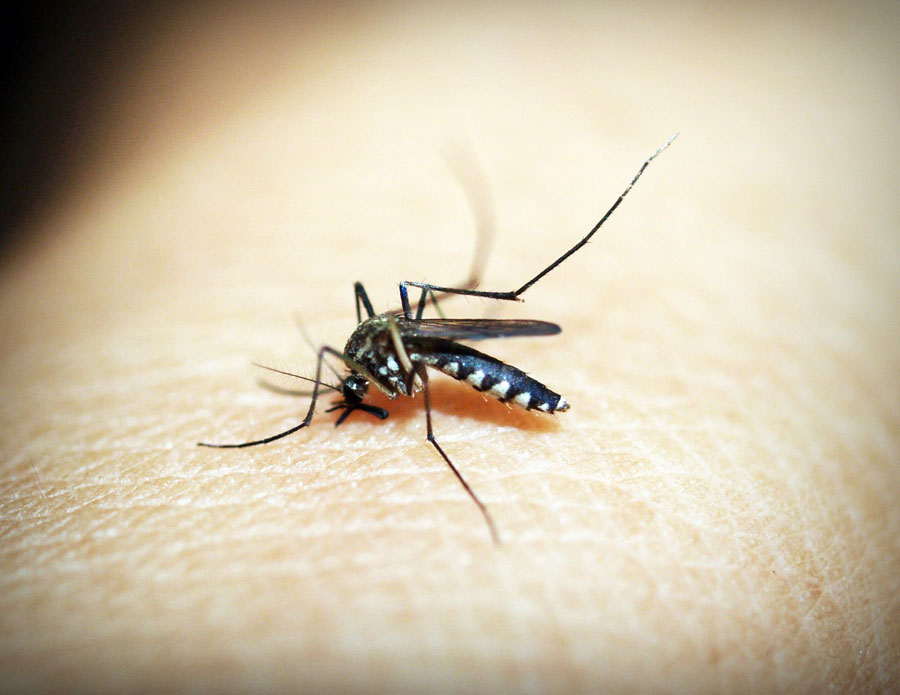
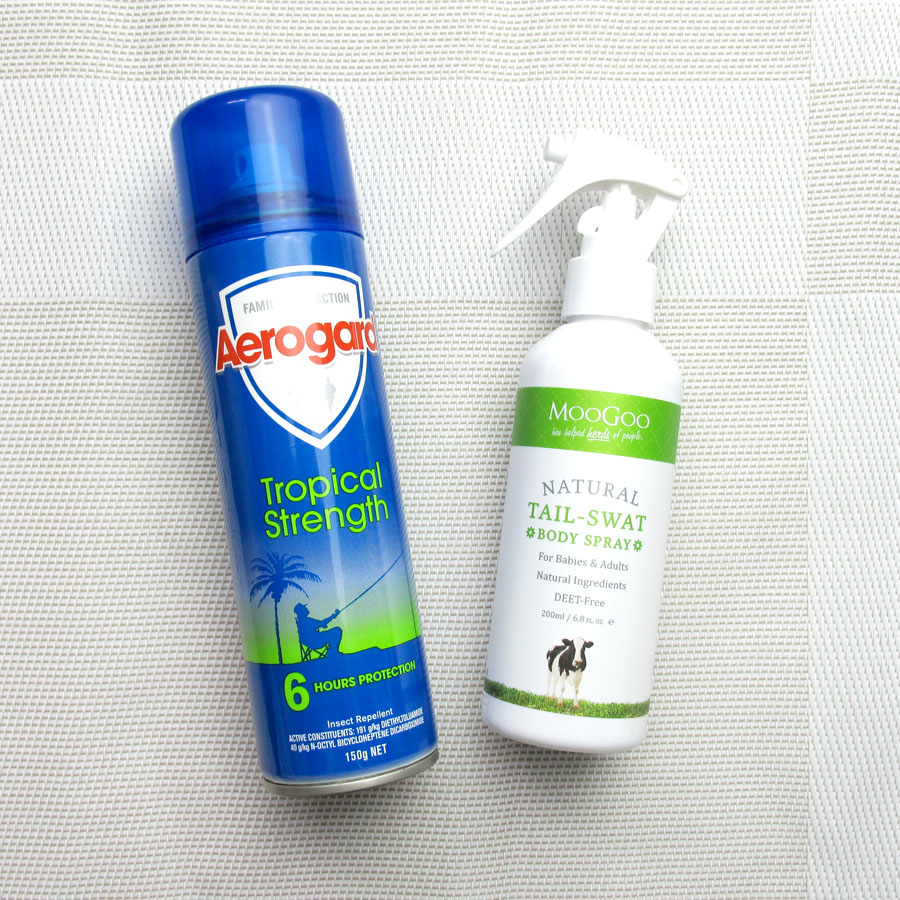
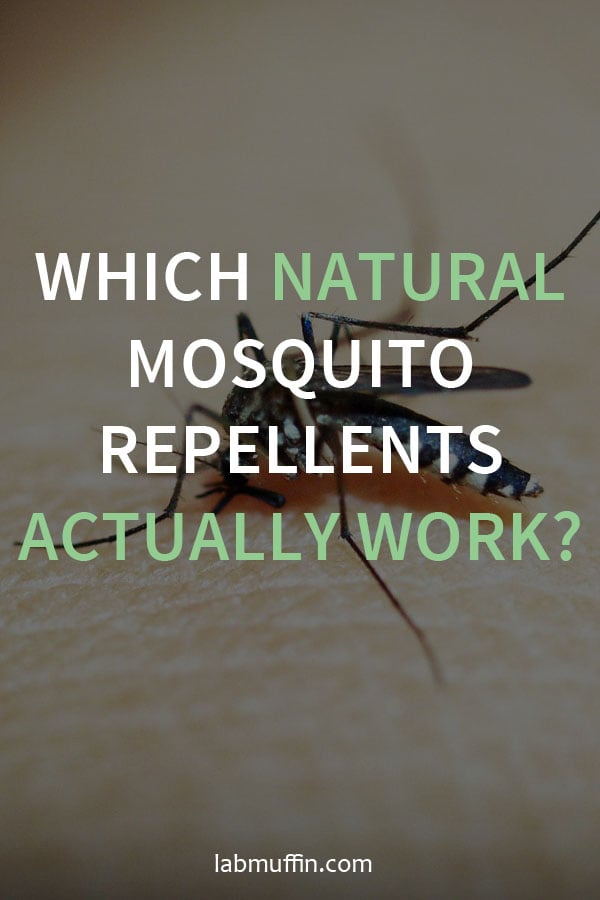


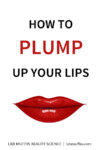
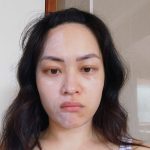
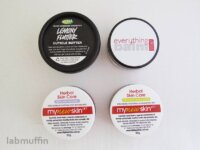

We use the Thermacell mosquito repellers. I find them more effective than the Off clip-ons, which may just have to do with how much repellent they are kicking off. We usually use two–one at either end of a picnic-table sized area. There is the caveat of them not being as effective when you’re moving out of the cloud (ie hiking) but I just can’t stand the sticky grossness of any spray or lotion!
As for bites, I just use a small dab of ammonia–that used to be the active ingredient in the AfterBite sticks (I don’t know why they changed the formula). I think we bought a small bottle from a hardware store and it is lasting for years! Nothing else works for me except taking an allergy pill.
I’ll get bit by mosquitos in the open, in full sunshine… they just can’t seem to resist me! I don’t stay out after dark either, unless I want to be swarmed by every mosquito in the area. Even DEET doesn’t deter them. I just end up stinky and bit. I don’t remember it being like this when I was a kid. I’m not sure if there are more mosquitos or if something in my chemistry changed. We never used to have a tick problem where I lived either, and now if you go out near any trees without DEET from April-June, you’re bound to get ticks on you! ( I live in the northern part of the USA)
Thank you for this article. I also am one of those people that mosquitos target. I live in an area that has had a few deaths from disease-carrying mosquitos. I do not like DEET (who does!) but I have tried so many alternatives and always come back to it. I try to stay inside as much as possible but they always seem to make their way into the house, and to me, during the summer oftentimes. Clothing doesn’t help – they just drill through it. I am waiting for someone to invent a personal invisible shielding one of these days!
Mosquitos love me as well 🙁 I dab a bit of lavender essential oil on a bite and it takes away the itch. You can keep lavender essential oil handy in a roller ball and use it as a perfume roll on too. I made some strong citronella candles with the essential oil and will see how well they work this summer.
“DEET is a synthetic ingredient that works by scrambling the smell and taste signals of mosquitoes so humans smell less attractive to them.”
You mean to tell me mosquitoes love me cause I smell delicious? Weeeeee! 😀
In all seriousness, thanks for this post! Bookmarked it for the next time I go traveling.
Complete sympathies on the mosquito front – we must share the same natural fragrance 😉 … I was once warned when moving to India temporarily that if I were to get pregnant the hormonal changes would send mosquitoes wild. ha! I was squirming because that advice came from my department director – errr, ok, thankyou 😉
Right. I’m sold. I’m picking this up because I’m just sure that my blood is to mosquitoes what Indiana Jones always seems to seek. Or something like that.
Thank you so much! (Luckily I didn’t stock up on citronella out of desperation)